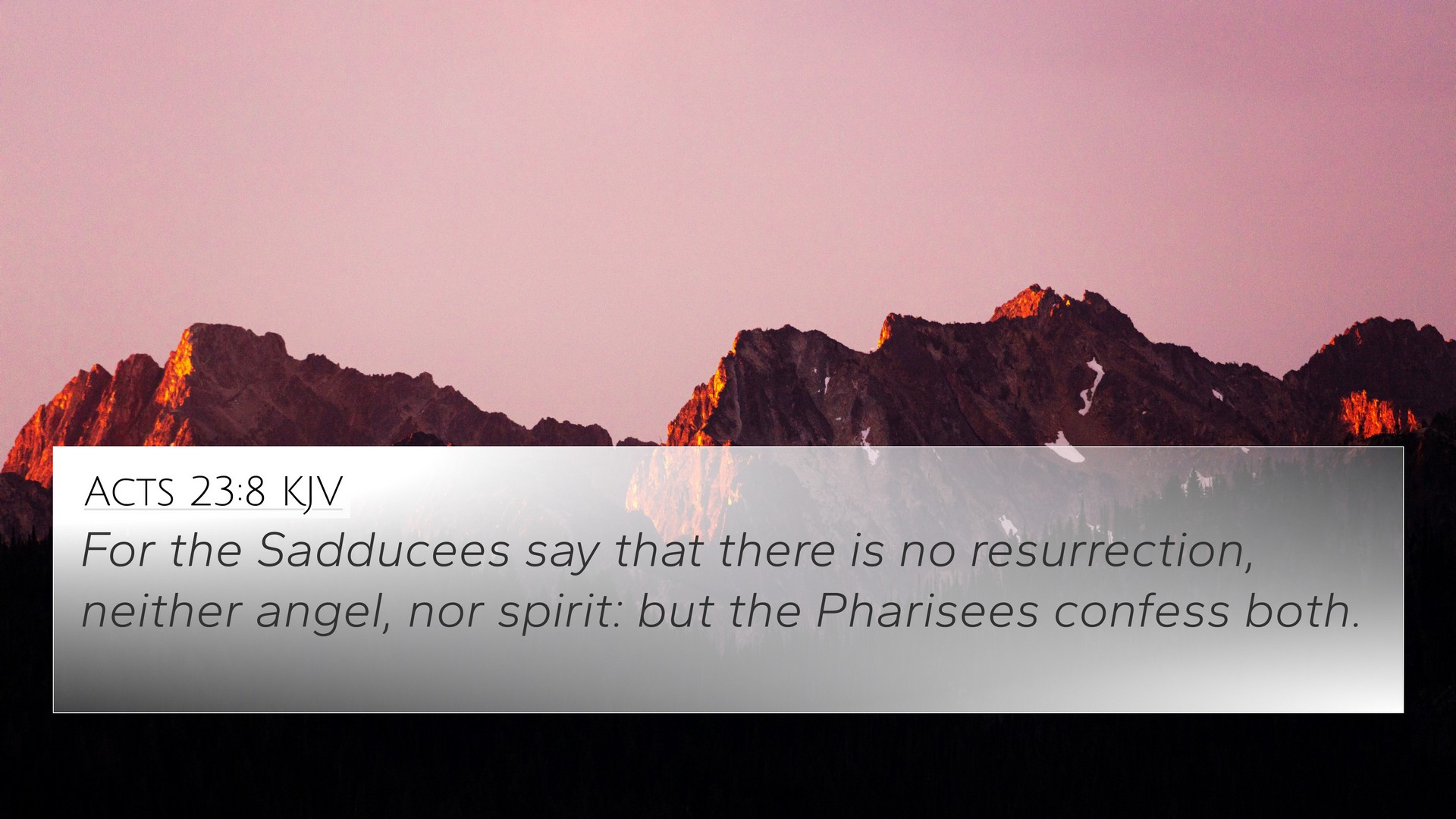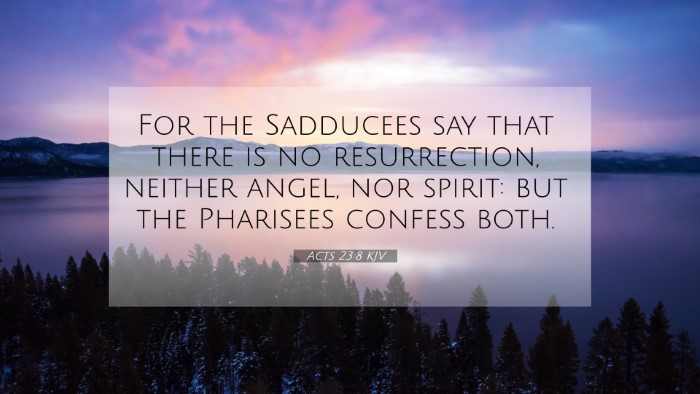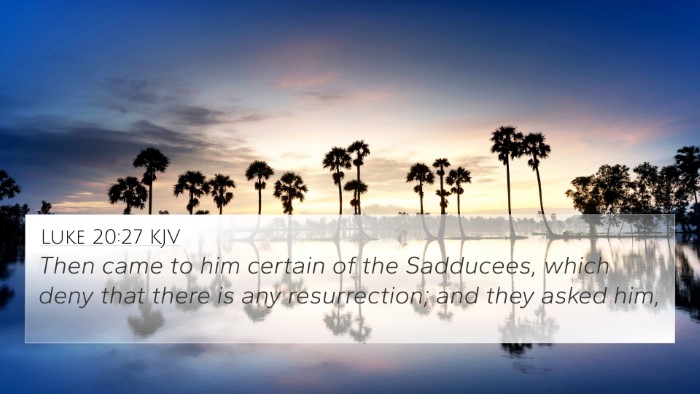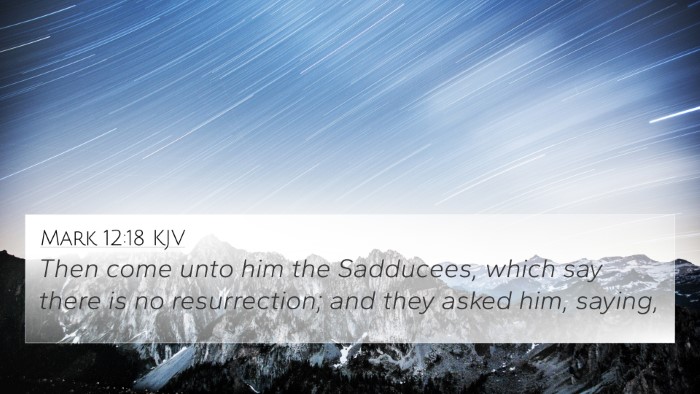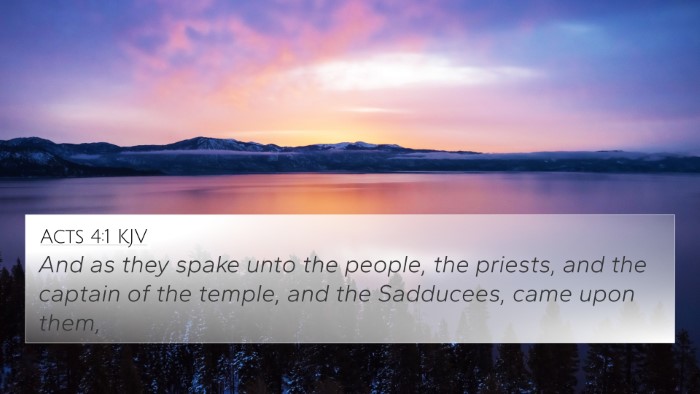Understanding Acts 23:8
The verse Acts 23:8 states:
"For the Sadducees say that there is no resurrection, and neither angel nor spirit; but the Pharisees affirm both."
Meaning and Insights from Public Domain Commentaries
This verse provides significant insights into the theological divide between two prominent Jewish sects of the time: the Sadducees and the Pharisees. The Sadducees were known for their strict adherence to the Torah and denied the existence of an afterlife, whereas the Pharisees believed in the resurrection and the presence of spiritual entities.
Matthew Henry's Commentary
Matthew Henry emphasizes the differences between these sects, noting that the Sadducees' denial of resurrection leads to a materialistic understanding of life. He suggests that this belief tends to influence how people view their relationship with God and the afterlife, prompting a lack of hope and driving moral decay.
Albert Barnes' Notes
Albert Barnes highlights that the Sadducees’ rejection of the resurrection aligns with their rejection of the oral traditions upheld by the Pharisees. He asserts that this rebuttal signifies a broader philosophical divergence regarding the interpretation of scriptures, particularly in how they understand divine revelation.
Adam Clarke's Commentary
Adam Clarke points out the political implications of this division, as the Pharisees generally had more influence among the common people, while the Sadducees represented the aristocracy. He elucidates that this rivalry is not just theological but also social and political, indicating how beliefs can both shape and be shaped by societal structures.
Connections and Cross-References
Acts 23:8 relates to various Bible verses that underpin the themes of resurrection, angelic presence, and doctrinal disputes. Here are some relevant cross-references:
- Matthew 22:23-33 - Describes the Sadducees questioning Jesus about resurrection.
- John 5:28-29 - Jesus affirms the resurrection of the dead.
- Mark 12:18-27 - Another instance of the Sadducees challenging the belief in resurrection.
- Acts 4:1-2 - The apostles faced opposition for preaching about the resurrection.
- 1 Corinthians 15:12-14 - Paul discusses the implications if there is no resurrection.
- Philippians 3:10-11 - Paul expresses his desire to know the power of Christ's resurrection.
- Hebrews 11:35 - Mentions the resurrection in relation to faith.
- Luke 20:34-36 - Jesus elaborates on the nature of life after resurrection.
- 1 Thessalonians 4:13-14 - Paul addresses the resurrection of believers.
Thematic Analysis
Acts 23:8 serves as a foundation for a broader thematic exploration of life after death and resurrection doctrine within the New Testament. Understanding this verse invites further examination of varied theological perspectives represented in the ecosystem of early Christianity.
Comparative Studies
Engaging in a comparative Bible verse analysis can shed light on how these beliefs shifted and evolved within early Christian communities. The statement of belief held by the Pharisees regarding resurrection is foundational, with its implications spilling over into numerous theological discussions and doctrines in the New Testament.
Bible Cross-Reference Techniques
Tools for cross-referencing can enhance the study of this verse. Utilizing a Bible concordance or a cross-reference Bible study guide makes it easier to identify connections to related themes and verses. This methodology aids in developing a comprehensive understanding of scripture.
Conclusion
In conclusion, Acts 23:8 provides critical insight into the early conflict between two sects of Judaism, highlighting the importance of resurrection in Christian theology. By exploring related verses and employing cross-referencing methods, one can gain a clearer understanding of the intricate theological and historical dynamics at play.
